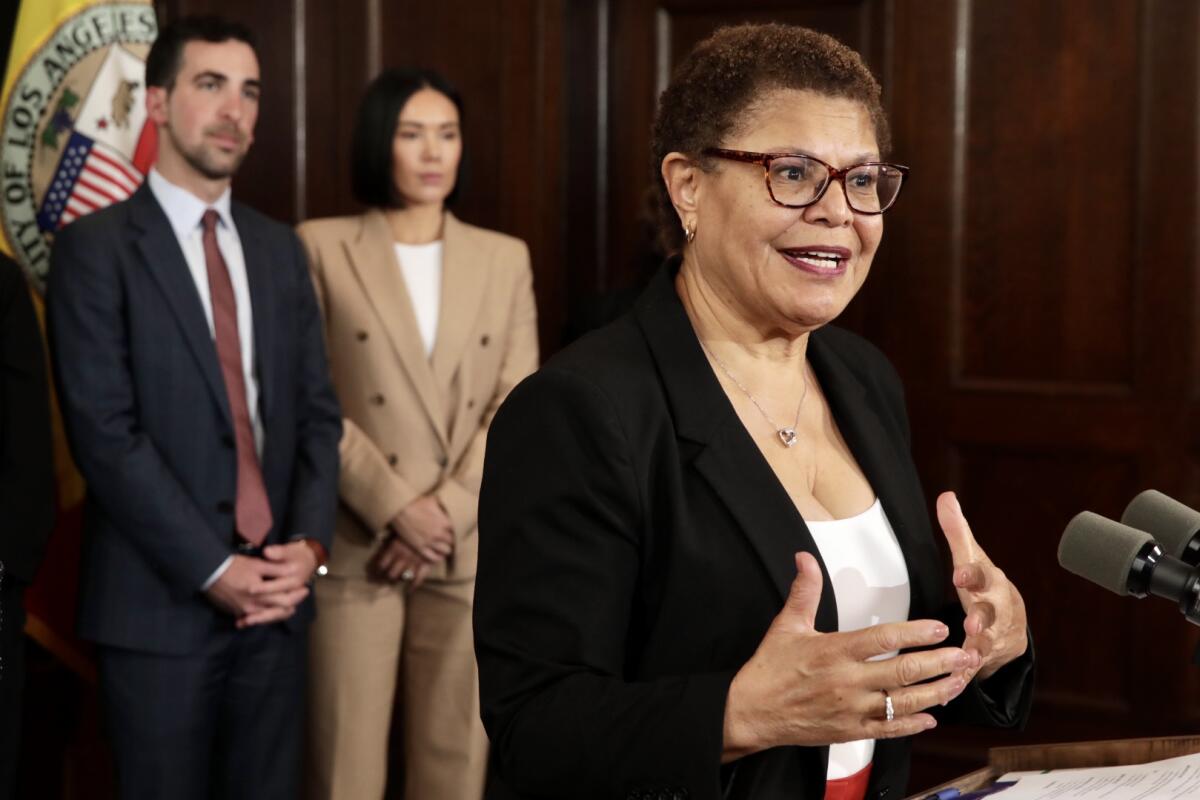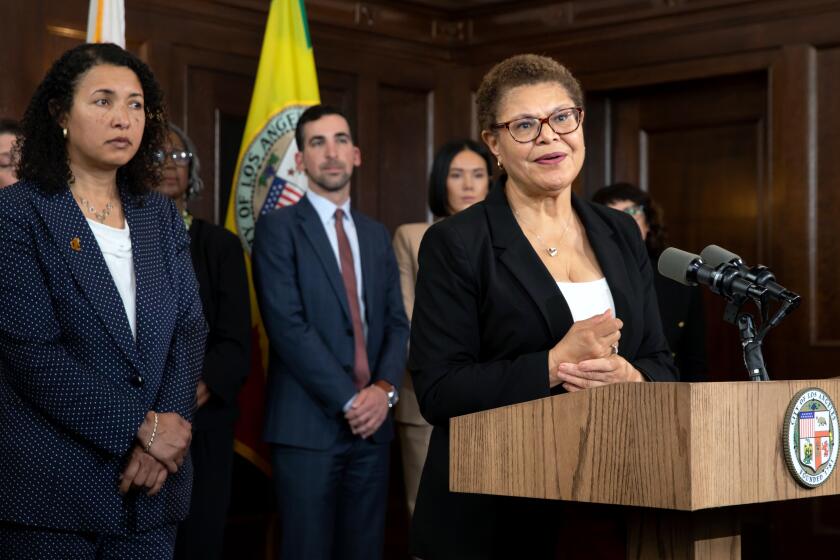Karen Bass wants to spend $1.3 billion to address homelessness. Here’s how

On Tuesday, Los Angeles Mayor Karen Bass announced that $1.3 billion of her $13 billion proposed budget will go to address homelessness.
She called the amount to tackle the homelessness crisis “unprecedented,” a 9.7% increase over the prior year. Bass set aside 20% of her homeless budget, $250 million, for Inside Safe, which is designed to move unhoused residents from street encampments indoors. Previously, the program had been leasing rooms around the city, but Bass’ team is looking to acquire at least eight motels or hotels.
“This is a truly historic city budget commitment — because much of the state and federal pandemic money from the past couple of years is no longer available,” she said during her State of the City speech on Monday.
Since taking office, homelessness has been at the forefront of her agenda, along with rebuilding the ranks of the Los Angeles Police Department.
The council must review and approve Bass’ budget by May 31. Once approved, the full spending plan will cover the fiscal year that starts July 1.
According to documents released by the Los Angeles city Mayor’s office, the money is distributed across 31 departments and funds that address homelessness and housing, including funding for police department homeless services and the Los Angeles Homeless Services Authority.
Bass is committing more money to homelessness than any prior city budget. The new mayor’s first spending plan reflects a leveling off after years of exponential growth in homeless spending fueled by state grants and the $1.2-billion Proposition HHH homeless housing bond approved by voters in 2016.
In his first two years in office, Mayor Eric Garcetti increased the homeless budget from $10 million to $100 million in 2015. Over the next six years it increased from $100 million to $1 billion.
The mayor’s spending plan for the coming year includes a key strategy for rebuilding the LAPD: persuading 200 recently retired officers to come back.
Bass’ budget, like Garcetti’s, includes hundreds of millions of dollars in state grants and Proposition HHH capital expenditures. Those sources were tapering off from their peaks in Garcetti’s final years.
With many of the housing projects now completed, Proposition HHH expenditures dropped from $416 million to $261 million. That decrease was balanced by new money from Measure United to House LA (ULA), a tax on property sales that was approved by voters in November.
Bass plans on using $150 million in revenue from Measure ULA for housing acquisition and rehabilitation. Due to risks with pending legislation challenging the measure, the proposed budget includes only a fraction of the $671 million it is projected to raise this year. The funding will focus mostly on homelessness prevention first, rather than building new construction.
The proposed budget for LAPD‘s homeless services includes $8.3 million in overtime for sworn officers to patrol the vicinity of interim homeless housing sites. The mayor’s documents note that part of the increase, double that of the previous year, is for the cost-of-living increase that is applied to overtime.
Funding from the state’s Homeless Housing, Assistance and Prevention Program, which includes four grants (some of which carried over), makes up $230 million of the budget, more than double the $92 million in Garcetti’s last budget. The funds will be used to support shelter operations, Project Homekey, outreach, public health services and programs for youths experiencing homelessness or at risk of being homeless.
Another large chunk of the increased budget is $68 million in federal grants that includes acquisition, rehabilitation and management of Project Homekey sites. The grants are down $13 million from the previous year.
The city will commit $38 million to LAHSA, about the same as the prior year, largely to fund street outreach, shelter operations and the annual homeless count.
Bass’ proposal also includes $72 million, $3.16 million more than last year, for funding positions for the CARE+ program — Comprehensive Cleaning and Rapid Engagement Plus — that removes abandoned waste and cleans homeless encampments.
Funding also will go to the city’s Community Investment for Families Department’s Solid Ground Program, which will distribute money to community organizations to help L.A. residents with financial assistance and housing search and case management. The program is estimated to receive $4.1 million, which is 2½ times more funding than last fiscal year.
More to Read
Sign up for Essential California
The most important California stories and recommendations in your inbox every morning.
You may occasionally receive promotional content from the Los Angeles Times.













